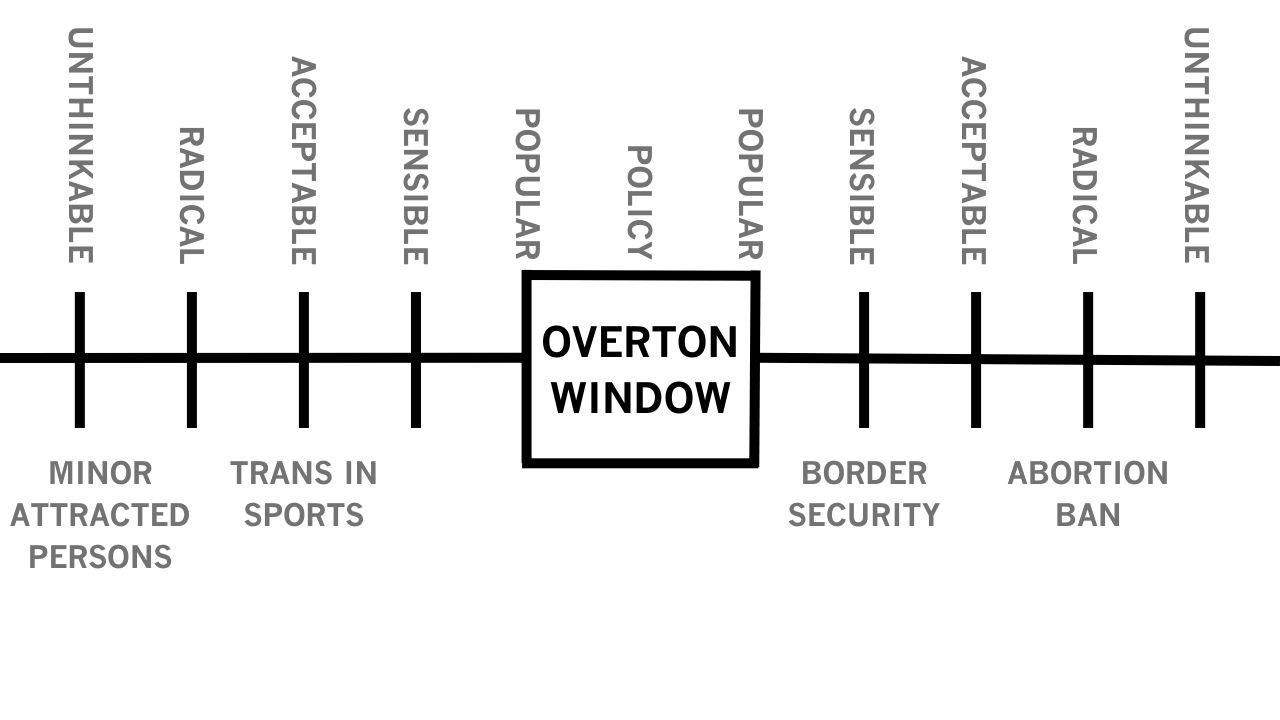In the mid-1990s, the late political analyst Joseph Overton developed a groundbreaking method for analyzing the journey an idea takes from radical to policy. This model came to be known as the “Overton window.”
Society exists within this window and the ideas we grapple with are fixed to a spectrum. As the Overton window slides to the left or right, ideas that were once fringe grow gradually normative.

Consider the temperance movement of the 19th century. What started as a campaign for moderation and responsible drinking shifted so far to the right that by the time of Prohibition, teetotaling was federal law and Christians had invented a revisionist theology in which Jesus turned water into grape juice rather than wine.
What might be more familiar is the abortion movement, which has gone from the slogan “safe, legal and rare” to “on-demand, celebrated and encouraged.” Average Democratic talking points from as recently as 2008 now sound like a Republican campaign speech.
Perhaps one of the most insidious examples of this pervasive creep to the left has been the invention and implementation of “preferred pronouns.”
Where/When
In a drastic and rapid devolution, the idea of having and using such pronouns went from total nonsense a handful of years ago to protected legislation in at least 22 states and the District of Columbia today.
California led the conga line to confusion with Senate Bill 179, passed in 2017. This bill recognized a third, “nonbinary” gender and imposed punishment on those who intentionally “misgender” an individual. Several states have since followed suit with similar legislation.
One of the first tests of such legislation came in 2018 when Virginia high school teacher Peter Vlaming refused to use a female student’s preferred male pronouns and was promptly fired.
Should Christians use “preferred pronouns”?
Vlaming did use the student’s preferred male name and avoided using any gendered language at all. However, that wasn’t enough for his employer. He had to use the make-believe gendered language.
This is a radical new precedent. It’s one thing to punish your subjects for saying the wrong things, but it’s an entirely new level of intellectual tyranny to punish them for not saying the right things. Proscriptive laws surrounding free speech are bad enough, but these new laws border on prescriptive.
A similar ethical dilemma came to the forefront in 1943 with the Supreme Court case West Virginia State Board of Education v. Barnette.
The court ruled that schools cannot compel students to salute the flag or recite the Pledge of Allegiance, as these are inherently ideological confessions that the government cannot force an individual to make.
Justice Robert H. Jackson wrote in the court’s opinion, “If there is any fixed star in our constitutional constellation, it is that no official, high or petty, can prescribe what shall be orthodox in politics, nationalism, religion, or other matters of opinion or force citizens to confess by word or act their faith therein.”
Who/What
Amid the controversy and legal turmoil of this newly invented language and its prescriptive use, secular corporations have wholesale adopted the delusion and required their employees to include their preferred pronouns in their email signatures or on their name tags.
Now, again, it would be one thing to simply allow employees who identify as “transgender” to utilize these pronouns in public settings, but requiring everyone to participate in the mental illness approaches never-before-seen levels of thought policing.
In light of this chaos, one would hope to be able to look to the Christian church for a lifeline anchored to the shore of truth. Unfortunately, and not surprisingly, the evangelical world at large has fallen flat on its face.
Leading Christian publications refuse to take a principled stance on the matter, deferring instead to an “evenhanded” approach that hears both sides out. We’re told, “Everything is changing so fast, we’re figuring it out together, and we should give each other grace.”
To hell with that.
What takes precedence, respecting the God-given identities of human beings, or polluting our language in order to “protect our witness” and not harm relationships?
Why/How
“So God created human beings in his own image. In the image of God he created them; male and female he created them” (Genesis 1:27, New Living Translation).
God did not create a nonbinary gender. God did not create an order that allows men to become women and women to become men.
God’s design is perfect, and while the curse of sin has brought illness, death and mutations to God’s design, none can rewrite it. Even intersex individuals born with defects to their genitalia (0.018 percent of births) still exist within the binary of XX or XY chromosomes.
When a Christian uses someone’s make-believe pronouns, they are conceding that the confusion is justified and that the gender myth is real. They are denying God’s given order.
What’s even worse is the Christians who take it a step further and voluntarily list their pronouns in their email signature or on their social media pages, thus virtue-signaling to the world, “Hey everyone, I’m one of you.”
What sets God’s people apart from the world if we are keeping up with it stride for stride, chasing lustfully after its idols of relevancy and modernity?
But it’s not enough to merely opt out, to decline to bow to the idols. As Christians, we are obligated to destroy those idols.
We knock down the strongholds of human reasoning and false arguments. We destroy every obstacle that keeps people from knowing God. We capture their rebellious thoughts and teach them to obey Christ. (2 Corinthians 10:4-5)
That sounds a lot less like a bunch of soft-handed losers concerned about “protecting their witness,” and a lot more like Christian warriors storming the enemy’s trenches with flamethrowers.
But the Bible also says we aren’t to use flamethrowers (worldly weapons) but God’s weapon. What is that?
Truth. Truth in two parts.
Part 1 is how we anchor ourselves to a firm foundation. No matter how far the Overton window shifts, no matter how radical or extreme we sound or look, we don’t budge — we don’t move an inch.
When the lost of the world are cast adrift in an ocean of despair, desperately treading water over 20-foot waves, we give them a lighthouse that casts hope, an immovable, indestructible fortress that shrugs off tide after tide, as it has done for millennia and will do for millennia.
Part 2 is how we go on the offensive.
When the Roman Empire expanded, the first thing legionaries did was establish a fort. The second thing they did was patrol the area surrounding the fort, capturing enemies and looking for weaknesses and opportunities to further expand the empire.
It’s not enough to build a tall wall and garrison it with soldiers. That will not preserve us. Leonidas had his Ephialtes. America had her Benedict Arnold. The enemy will always find a way through the defenses.
As Paul taught, we don’t just extinguish the fiery flames by knocking down false reasoning. We capture. We catechize. We take ground. We grow the kingdom.
And we certainly, assuredly, do not respect preferred pronouns.


